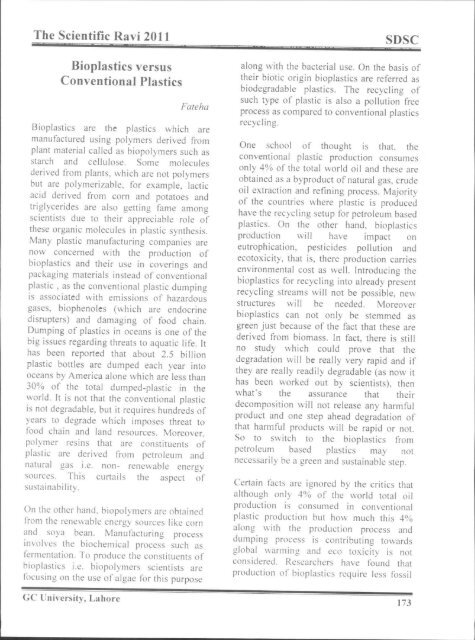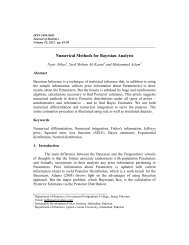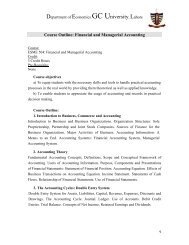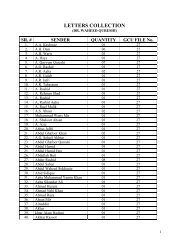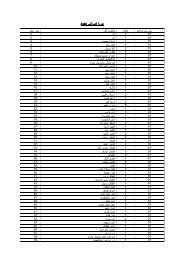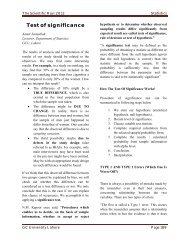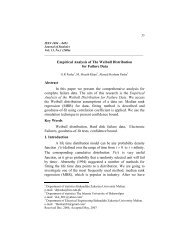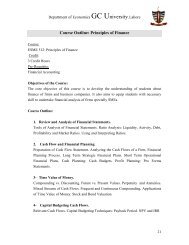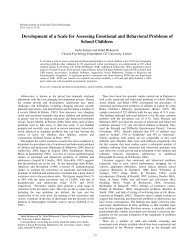The Scientific Ravi 2011 - Government College University
The Scientific Ravi 2011 - Government College University
The Scientific Ravi 2011 - Government College University
You also want an ePaper? Increase the reach of your titles
YUMPU automatically turns print PDFs into web optimized ePapers that Google loves.
<strong>The</strong> <strong>Scientific</strong> <strong>Ravi</strong> <strong>2011</strong><br />
Bioplastics<br />
Conventional<br />
versus<br />
Plastics<br />
Fatella<br />
Bioplastics are the plastics which are<br />
manufactured using polymers derived from<br />
plant material called as biopolymers such as<br />
starch and cellulose. Some molecules<br />
deriwd trom plants, which are not polymers<br />
but are polymerizable, for example, lactic<br />
acid deri ved from corn and potatoes and<br />
triglycerides are also getting fame among<br />
scientists due to their appreciable role of<br />
these organic molecules in plastic synthesis.<br />
;-' ..1any plastic manufacturing companies are<br />
now concerned with the production of<br />
bioplastics and their use in coverings and<br />
packaging materials instead of conventional<br />
plastic. as the conventional plastic dumping<br />
is associated with emissions of hazardous<br />
gases. biophenoles (which are endocrine<br />
disrupters) and damaging of food chain.<br />
Dumping of plastics in oceans is one of the<br />
big issues regarding threats to aquatic life. It<br />
ha~ been reported that about 2.5 billion<br />
plastic bottles are dumped each year into<br />
oceans bv America alone which are less than<br />
30% or' the total dumped-plastic in the<br />
world. It is not that the conventional plastic<br />
is not degradable. but it requires hundreds of<br />
veal'S to-degrade which imposes threat to<br />
j'ood chain ~nd land resources. Moreover.<br />
polc-mer resins that are constituents of<br />
plastic are derived from petroleum and<br />
natural gas i.e. nOI1- renewable energy<br />
sourccs. This curtails the aspect of<br />
slistainabilit).<br />
On the other hand. biopolymers are obtained<br />
Irom the renewable energy sources like corn<br />
and soya bean. ivlanufacturing process<br />
involve; the biochemical process such as<br />
fermentation. To produce the constituents of<br />
bioplastics i.e. biopolymers scientists are<br />
tixusin~ on the use of al~ae ")I" this purpose<br />
- -<br />
GC <strong>University</strong>, Lahore<br />
SDSC<br />
along with the bacterial use. On the basis of<br />
their-biotic origin bioplastics are referred as<br />
biodegradable plastics. <strong>The</strong> recycling of<br />
such ;vpe of plastic is also a pollution tree<br />
proces's as compared to conventional plastics<br />
recycling.<br />
One school of thought is that. the<br />
conventional plastic production consumes<br />
only 4% of the total world oil and these are<br />
obtained as a byproduct of natural gas. crude<br />
oil extraction and refining process. Majority<br />
of the countries \\here plastic is produced<br />
have the recycling setup for petroleum based<br />
plastics. On the other hand. biopJastics<br />
production will have impact on<br />
eutrophication. pesticides pollution and<br />
ecotoxicitv. that is, there production carries<br />
environm~ntal cost as well. Introducing the<br />
bioplastics for recycling into already present<br />
recvcling streams will not be possible, new<br />
stn;clUr;s will be needed. Moreover<br />
bioplastics can not only be stemmed as<br />
green just because of the fact that these are<br />
derived from biomass. In fact. there is still<br />
no studv which could prove that the<br />
degradation will be really very rapid and if<br />
th;v are reallv readilv degradable (as now it<br />
has' been w~rked O~il by scientists). then<br />
what's the assurance that thei I'<br />
decomposition will not release any harmful<br />
product and one step ahead degradation of<br />
that harmful products will be rapid or nol.<br />
So to s\\ itch to the bioplaslics from<br />
petroleum based plastics may not<br />
necessarily be a grecn and sustainable step.<br />
Certain t;lCts arc ignored b" the critics lhat<br />
althouoh onlv 4'Y; of the - world total oil<br />
produc~ion i~ consumed in conventional<br />
plastic pmduction but how much this 4%<br />
along \\'lth the production process and<br />
dumping process is contributing towards<br />
glohal \varming and eco toxicity is not<br />
~onsidered. Re~earchers have fo'und that<br />
production of bioplasties require less t,'ssil<br />
173


